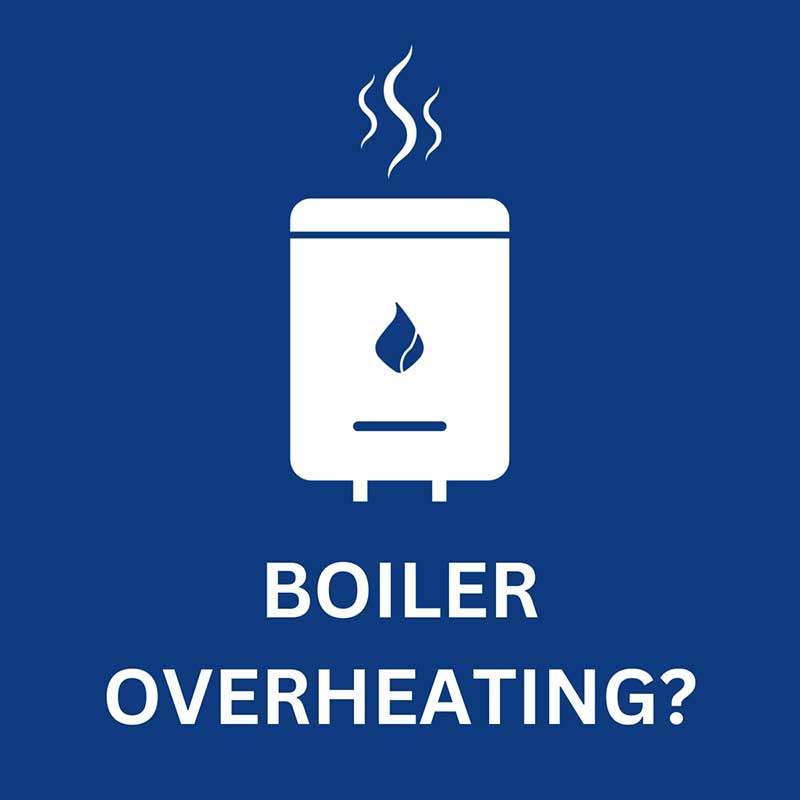
Is your Boiler Overheating? Read on for the Signs, Symptoms & Solutions
Our Boilers are essential appliances for comfortable modern-day living providing heat and hot water in our homes.
Ensuring the safety and efficiency of Boilers is very important. One safety aspect is to ensure your Boiler isn’t overheating.
This article provides an in-depth understanding of the signs and symptoms of a Boiler overheating and the solutions available for each type of Boiler.
By understanding these issues, homeowners and landlords can take the necessary steps to ensure the safety and efficiency of their Boilers.
Types Of Boiler
There are three main Boilers types.
Each type has specific uses, features and advantages, but all Boiler types are prone to overheating.
Signs & Symptoms Of Overheating Boilers
The following signs indicate your Boiler may be overheating (Please note Other issues can also cause the following signs)
Banging Or Knocking Sounds
Overheating boilers may produce banging or knocking sounds due to the rapid expansion and contraction of internal components, such as pipes and heat exchangers.
Hissing Or Whistling Noises
Hissing or whistling sounds can result from steam or water escaping through cracks or leaks in the boiler system, indicating overheating or excessive pressure.
Gurgling Or Rumbling Sounds
These noises can signal water boiling inside the Boiler, which may occur when the heat exchanger cannot dissipate heat effectively.
Higher Energy Bills
Overheating boilers often consume more fuel, leading to increased utility bills.
Boiler Running More Frequently Or For Longer Periods
If your Boiler seems to be running more frequently or for longer durations, it may struggle to maintain the required temperature due to overheating.
Discoloured Or Scorched Casing
Overheating may cause the Boiler’s casing to become discoloured or scorched, indicating excessive heat build-up.
Leakage Or Dripping From The Boiler
Water leaks around the Boiler or its components, such as pressure relief valves, may indicate overheating or excessive pressure within the system.
Fluctuations In Hot Water Or Room Temperature
An inconsistent hot water supply or fluctuating room temperatures may indicate that the Boiler struggles to maintain the set temperature due to overheating.
Radiators Take Longer To Heat Up Or Uneven Heating
If your radiators take longer to heat up or exhibit uneven heating, it may be a sign that your Boiler is not dissipating heat effectively because it’s overheating.
High Or Low Boiler Pressure
Abnormal pressure readings on the Boiler’s pressure gauge, either too high or too low, can indicate overheating.
Pressure Relief Valve Releasing Water Frequently
If the pressure relief valve frequently discharges water, it may indicate excessive pressure in the system due to overheating.
Insufficient Water Flow
A common cause of boiler overheating is insufficient water flow through the heat exchanger.
This can be due to debris build-up, scale formation, or a malfunctioning pump.
When the water flow is restricted, the heat exchanger cannot dissipate heat effectively, causing the Boiler to overheat.
Faulty Safety Devices
Boilers are equipped with safety devices, such as temperature and pressure relief valves. However, the Boiler may overheat if these devices are faulty or malfunctioning.
Incorrectly Set Controls
If the controls on the Boiler are set too high, the appliance may produce more heat than the system can handle, leading to overheating.
Blocked Diverter Valve
Combi boilers use a diverter valve to direct hot water to the central heating system or the domestic hot water supply. If the valve becomes blocked, it can cause the Boiler to overheat when the hot water is not being used.
Faulty Pump
The pump is responsible for circulating hot water through the system. If the pump fails or becomes inefficient, the Boiler may overheat due to inadequate water flow.
Blocked Or Damaged Expansion Vessel
System boilers have an expansion vessel that helps maintain proper pressure. However, if the vessel becomes blocked or damaged, the pressure may rise, causing the Boiler to overheat.
Inadequate Heat Dissipation
Boilers may struggle to dissipate heat effectively if there is insufficient heat transfer between the Boiler and the radiators. This can result from poor system installation or a build-up of sludge and debris in the radiators.
Solutions for Overheating Boilers
Here are some common solutions for overheaing Boilers
Addressing Water Flow Issues
If your Boiler is overheating due to insufficient water flow, hire a Gas Engineer to inspect and clean the heat exchanger, pump, and other components that may be restricting water flow.
Replacing Faulty Safety Devices
If the safety devices, such as temperature and pressure relief valves, are malfunctioning, have them inspected and replaced by a certified Gas Engineer.
Adjusting Boiler Controls
Ensure that the boiler controls are set according to the manufacturer’s recommendations. Incorrectly set controls can lead to overheating and poor energy efficiency.
Clearing Or Replacing The Diverter Valve
If a blocked diverter valve is causing the Boiler to overheat, it will need replacing by a Gas Engineer.
Repairing Or Replacing The Pump
If the pump in your Boiler is faulty or inefficient, have it inspected and repaired or replaced as necessary.
Servicing Or Replacing The Expansion Vessel
If the expansion vessel is blocked or damaged, an engineer should replace it to restore proper pressure and prevent overheating.
Improving Heat Dissipation
If your central heating system is struggling with heat dissipation, consider having your system Powerflushed to improve heat transfer.
The Importance Of Gas-Safe Registered Engineers
Boiler inspections and repairs should always be performed by Gas Safe Registered engineers who have the training, experience, and tools to diagnose and resolve boiler issues safely and effectively.
Fixing Boiler issues without proper knowledge, experience, and credentials is dangerous. Always consult a certified Gas Engineer if you suspect your Boiler is overheating or experiencing other issues.
Preventive Measures & Maintenance
You can do a few things to keep your Boiler in good working order and reduce the possibility of overheating.
Regular Servicing
Annual Boiler Servicing by a qualified Gas Engineer will help identify and prevent potential issues before they escalate.
Regular maintenance will also maintain Boiler efficiency and extend its lifespan.
Checking & Maintaining Boiler Pressure
Monitoring and maintaining the correct Boiler pressure can help prevent Boiler overheating. Regularly check the pressure gauge and adjust the pressure if necessary, following the manufacturer’s recommendations.
Ensuring Proper Water Circulation
Regularly bleed radiators and check for signs of poor water circulation, such as cold spots or uneven heating. This can help prevent issues related to inadequate heat dissipation.
Thermostat Calibration
Ensure that the thermostat is calibrated correctly and functioning properly. A faulty thermostat can cause the Boiler to overheat or operate inefficiently.
Need Help With An Overheating Boiler?
TM Hughes & Son Gas Services Ltd have a team of Gas Safe Registered engineers covering the county of Essex.
If you live in the area and would like an engineer to inspect your Boiler, please contact us.

Hi, I’m Terry, the founder and owner of TM Hughes & Son Gas Services
Please get in touch to book an appointment or receive a free, no-obligation quote
Call – 01245 830075
Email – info@tmhughesandson.uk
0% Finance
For Boiler Installations & Repair
